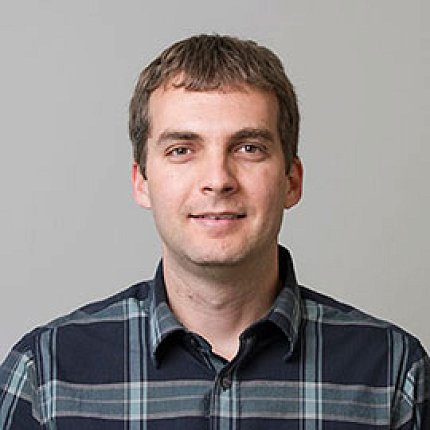Machiela Named Stadtman Investigator

Dr. Mitchell Machiela was recently appointed Earl Stadtman tenure-track investigator in NCI’s Laboratory of Genetic Susceptibility (LGS). Machiela studies the role of germline variation and somatic mosaicism in cancer risk. He joined the Laboratory of Translational Genomics as a postdoctoral fellow in 2012, transitioned to LGS in 2015, and was promoted to research fellow in 2016.
Machiela leads studies of large-scale genetic mosaicism to investigate the causes of acquired mosaic alterations and their impact on cancer risk. Genetic mosaicism results from a DNA mutation that is present in some of the body’s cells but not in others. A person with mosaicism has a mixture of normal and mutated cells.
“Mosaicism is a somatic event, meaning a mutation occurs sometime in life after fertilization. It is not an inherited genetic variant,” said Machiela. “We define mosaicism quite broadly; it can be limited to a one base pair change in your genome different from what you inherited. Or, it can be as large as an entire chromosome that is lost or duplicated.”
Machiela and collaborators have published a number of studies estimating the frequency and distribution of mosaicism in existing genotyped collections of blood and buccal DNA. Now, he is utilizing an unparalleled set of genotype data—200,000 DCEG samples, 500,000 genotyped samples from the UK Biobank and a merged international mosaicism consortium of over 1 million samples—to expand the size and scope of his research on mosaicism and cancer risk.
In addition, he is developing improved approaches for detecting genetic mosaicism.
“Previous studies have focused on detecting mosaic events larger than 2 megabases in size and affecting cellular proportions of 10 percent or greater,” he said. “This is a conservative threshold to ensure detected events have a high true positive rate. We are now exploring ways to use haplotype data to improve the array-based detection of events affecting a smaller proportion of cells.”
In recent studies, he and colleagues found evidence to suggest that mosaicism increases cancer risk for hematologic malignancies and select solid tumor subtypes. He is expanding this work to examine the influence of mosaicism on cancer risk in various populations and tissue types.
Machiela is also the creator of a web-based tool LDlink, which interactively explores linkage disequilibrium across population groups from the 1000 Genomes Project. LDlink is tailored for investigators interested in mapping disease susceptibility loci by generating output linking correlated alleles and highlighting putative functional variants.
